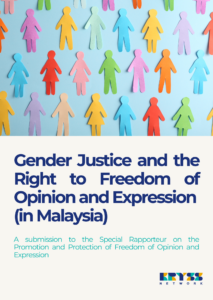
In Malaysia, while gender inequality is often and rightly addressed in terms of gender-based violence and its discriminatory impacts, the impact of gender inequality on freedom of expression is largely unaddressed. A framework for unrestrained freedom of expression means very little to women and gender non-conforming persons if it ignores the inherent power dynamics in our access to human rights and equal protection under the laws.
This submission is in response to the call by the Special Rapporteur on Freedom of Opinion and Expression, Irene Khan to analyse the challenges that women face, offline and online. Adopting a gender lens, she finds that despite the impressive gains made by women, gender equality in freedom of expression remains a distant goal. She reaffirms the mutually reinforcing nature of gender equality and the right to freedom of opinion and expression and underlines the vital importance of their inclusive realisation for the achievement of peace, democracy, and sustainable development. The Special Rapporteur makes specific recommendations to States, the international community, and companies to create an enabling environment and safe digital space for women’s equal enjoyment of freedom of opinion and expression.
In this submission drafted by KRYSS Network with input from the Centre for Independent Journalism and Women’s Aid Organisation, we offer arguments and an overview on the inherent inequalities in one’s access and exercise of freedom of opinion and expression (shorten to freedom of expression herein) based on one’s gender identity and other identity markers. Among the barriers and challenges identified are: online gender-based violence, moral policing, and the abuse of cultural relativism, no real mechanism on gender-disaggregated data on the violations, self-censorship, abuse of freedom of expression to silence women, and shrinking spaces for public participation.
As we reimagine freedom of expression from a feminist perspective, we emphasise that:
- A feminist perspective to freedom of expression will recognise that such freedom is not equally and justly accorded to everyone, and even when one is given the platform to speak, it does not mean they are heard. Gender norms and social inequalities define how people from diverse gender should express, behave and socialise with others.
- The dominant discourse around freedom of expression often and rightly focuses on state prosecution and persecution against individual who speak up against abuse of power by the state or the corporation. Many other forms of expressions are shared online every day and they fall through the surveillance of the government, its institutions or any political entity. They are opinions about a variety of issues people encounter every day i.e. an “outfit of the day” picture, a wedding picture between lesbian couple, story told by a Covid positive person, fundraising messages for refugees community. Such forms of expression are equally important, if not essential to the full enjoyment of a wide range of other human rights. Violation and impediment to these freedom of expression must be addressed.
- Any restrictionsplaced on freedom of expression cannot be religious-based or politically motivated. Prohibition on freedom of expression by existing laws should be reviewed especially if it only serves to further the interests of those with power and privilege. Restriction on freedom of expression should examine power and privilege, the harms done and how the harm can be perpetuated through the expression.
- A feminist perspective to freedom of expression will understand that the inability to identify the perpetrator(s) of the violations and harms done should not mean that equal access cannot be assured. There has to be measures in place to ensure that the views/perspectives are heard, especially if there are policy and legal implications.

